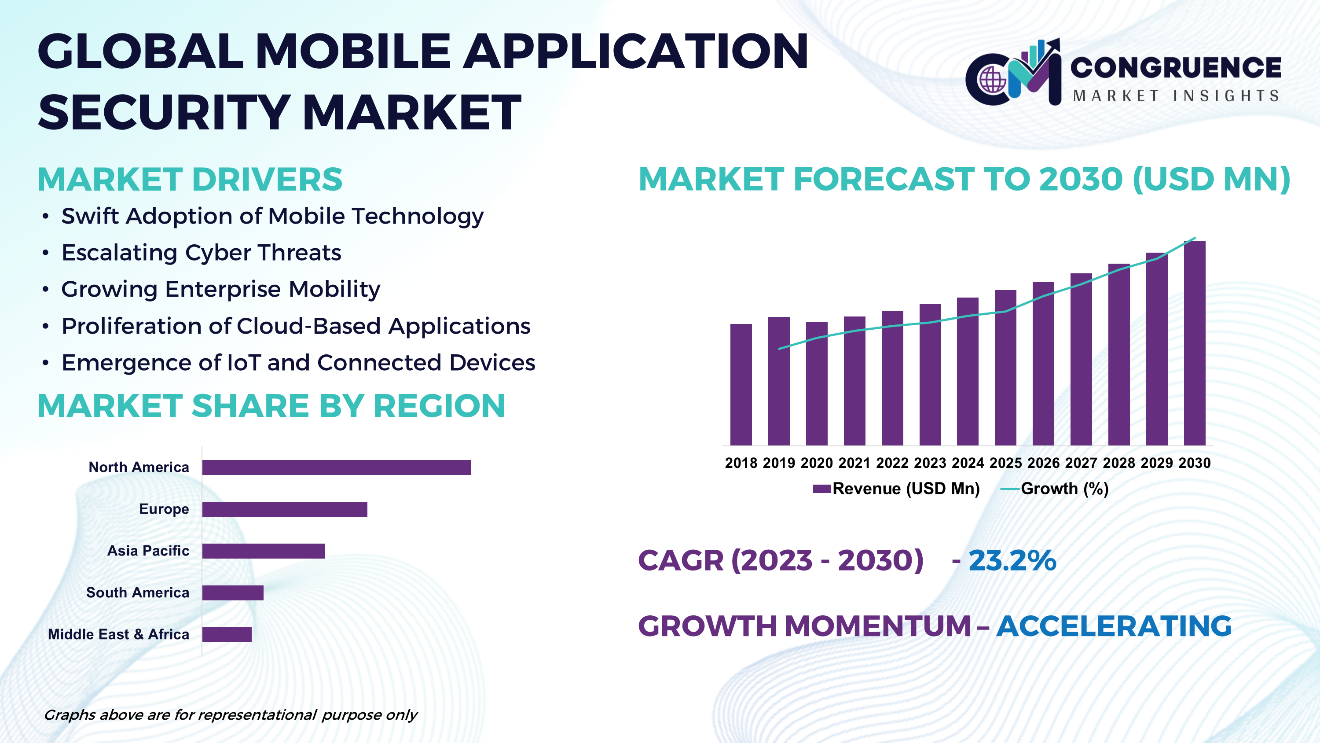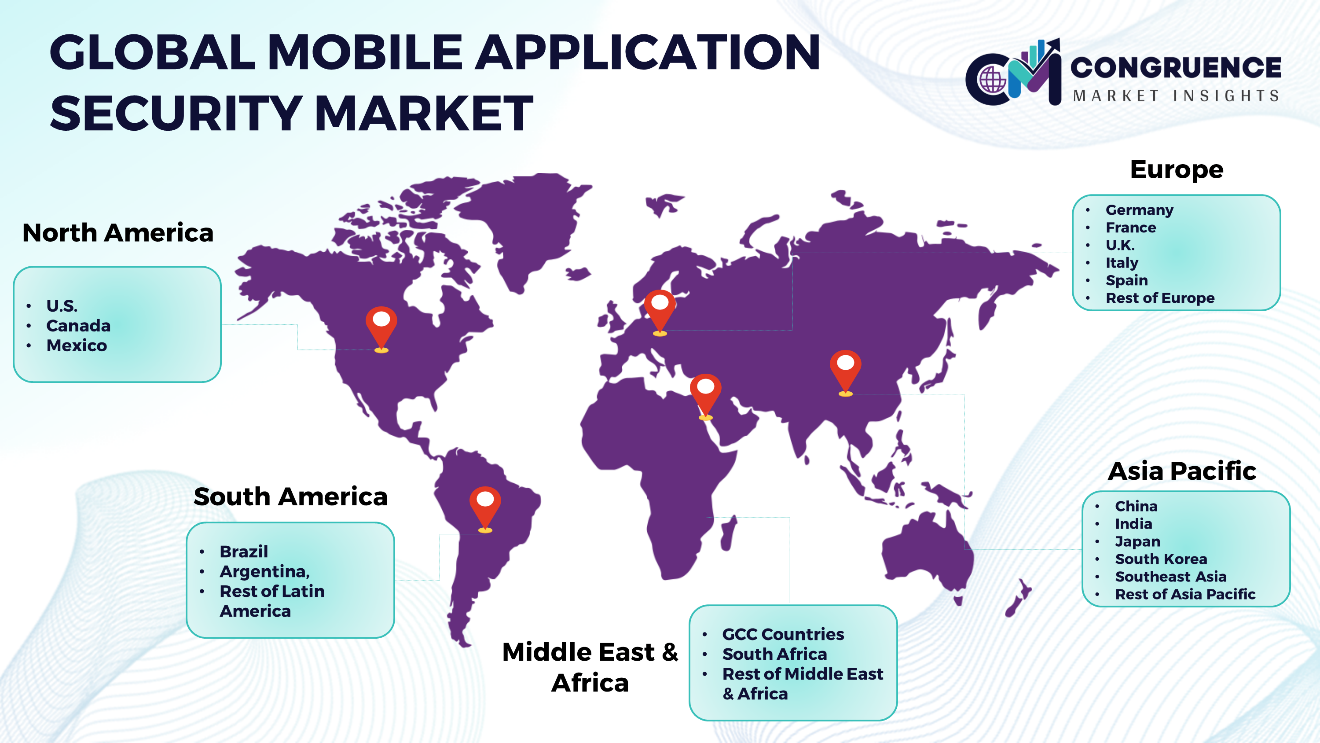Reports
The Global Mobile Application Security Market is expected to expand at a CAGR of 23.2% between 2023 and 2030. M Mobile application security holds paramount importance in today's digital milieu, particularly amidst the burgeoning deployment of cloud-based applications and the pervasive penetration of smartphones. As an increasing volume of sensitive data migrates to the cloud and users rely extensively on mobile devices for various tasks, ensuring robust security measures becomes imperative. Technological advancements have spurred the development of sophisticated security solutions, encompassing authentication methods such as biometrics and advanced encryption techniques. The market landscape of mobile application security is dynamic, featuring established entities like IBM and Symantec alongside innovative startups offering cutting-edge solutions. Given the perpetual evolution of threats, maintaining a steadfast focus on mobile application security remains pivotal to safeguarding user privacy and upholding data integrity.

Mobile Application Security Market Major Driving Forces
Swift Adoption of Mobile Technology: The pervasive integration of smartphones and tablets into daily activities has accentuated the imperative for secure mobile applications. Consequently, businesses are compelled to invest in robust security measures to meet this demand.
Escalating Cyber Threats: The escalating frequency and sophistication of cyber threats, spanning malware, data breaches, and ransomware attacks, underscore the crucial need for effective mobile application security solutions. These are essential to safeguard sensitive data and uphold user privacy.
Growing Enterprise Mobility: The burgeoning trend towards remote work and Bring Your Own Device (BYOD) policies in enterprises necessitates comprehensive mobile application security solutions. These solutions secure corporate data accessed via mobile devices, mitigating the risks of unauthorized access and data leakage.
Proliferation of Cloud-Based Applications: The increasing adoption of cloud-based applications and services demands robust security measures to protect data stored and transmitted across cloud platforms. This drives the demand for mobile application security solutions that seamlessly integrate with cloud environments.
Emergence of IoT and Connected Devices: The proliferation of Internet of Things (IoT) devices and interconnected smart ecosystems introduce new security challenges. This accentuates the importance of mobile application security to preempt potential vulnerabilities and cyber-attacks targeting IoT-enabled mobile applications.
Mobile Application Security Market Key Opportunities
Emergence of IoT Security: With the rapid proliferation of Internet of Things (IoT) devices, there's a burgeoning need for robust security solutions tailored to the unique challenges posed by connected devices. Mobile application security providers have the opportunity to extend their offerings to encompass IoT security, addressing vulnerabilities in IoT-enabled mobile applications and devices.
Integration with DevOps Practices: The adoption of DevOps practices continues to grow, emphasizing collaboration between development and operations teams to deliver applications more rapidly and reliably. Mobile application security vendors can seize the opportunity to integrate security seamlessly into the DevOps pipeline, enabling automated security testing and vulnerability management throughout the development lifecycle.
Enhanced User Authentication Methods: As the threat landscape evolves, there's a growing demand for advanced user authentication methods beyond traditional passwords. Mobile application security providers can capitalize on this opportunity by offering innovative authentication solutions such as biometrics, multi-factor authentication, and behavioral analytics to enhance user authentication and prevent unauthorized access.
Securing Mobile Payments and Transactions: With the increasing adoption of mobile payments and transactions, there's a critical need to secure financial data and prevent fraud. Mobile application security vendors can leverage this opportunity by offering solutions specifically designed to secure mobile payment applications, encrypt sensitive financial data, and detect fraudulent activities in real-time.
Mobile Application Security Market Key Trends
· Growing adoption of the Zero Trust model emphasizes continuous authentication and micro-segmentation to combat insider threats and external attacks.
· Increased use of containerization technologies enhances app security by isolating dependencies and reducing attack surfaces.
· AI and ML technologies enable real-time threat detection and behavioral analysis, enhancing overall security.
· Heightened emphasis on data encryption and access controls ensures compliance with data protection regulations like GDPR and CCPA.
· Integrating security early in the development process helps identify and address vulnerabilities sooner.
· Mobile threat defense tools use ML and threat intelligence to detect and mitigate mobile-specific threats like malware and phishing attacks.
· Real-time monitoring and automated incident response are crucial for quickly identifying and mitigating security incidents.

Market Competition Landscape
The market competition landscape in mobile application security is fiercely competitive, characterized by rapid innovation and evolving customer demands. Key players vie for market share by offering comprehensive security solutions, integrating advanced technologies, and adapting to emerging threats. The competitive landscape drives continuous improvement and innovation in security offerings.
Key players in the global Mobile Application Security market implement various organic and inorganic strategies to strengthen and improve their market positioning. Prominent players in the market include:
· IBM Corporation
· Capgemini
· Oracle
· SAP SE
· Salesforce, Inc.
· Microsoft Corporation
· Cisco Systems, Inc.
· Accenture
· Broadcom
· Check Point Software Technologies Ltd.
· McAfee, LLC
· Quick Heal Technologies Limited
· Trend Micro Incorporated
· Palo Alto Networks
· Trustwave Holdings, Inc.
· Veracode
· Pradeo
· Appknox (Xysec Labs)
· Rapid7
· AO Kaspersky Lab
· Zimperium
· NTT DATA Inc.
· NowSecure
· Protectt.ai Private Ltd.
· Digital.AI
· Lookout, Inc.
· OneSpan
· Guardsquare nv
|
Report Attribute/Metric |
Details |
|
Base Year |
2022 |
|
Forecast Period |
2023 – 2030 |
|
Historical Data |
2018 to 2022 |
|
Forecast Unit |
Value (US$ Mn) |
|
Key Report Deliverable |
Revenue Forecast, Growth Trends, Market Dynamics, Segmental Overview, Regional and Country-wise Analysis, Competition Landscape |
|
Segments Covered |
· By Solution (Mobile Application Security Testing (MAST), Mobile Application Management (MAM), Mobile Data Protection (MDP), Mobile Identity and Access Management (MIAM), and Others) · By Deployment Model (Cloud-Based, and On-Premises) · By Application (Data Encryption, Connection Security, Authentication, and Others) · By End-Use Industry (BFSI, Healthcare, Retail and E-Commerce, Government and Defense, IT and Telecommunications, and Others) |
|
Geographies Covered |
North America: U.S., Canada and Mexico Europe: Germany, France, U.K., Italy, Spain, and Rest of Europe Asia Pacific: China, India, Japan, South Korea, Southeast Asia, and Rest of Asia Pacific South America: Brazil, Argentina, and Rest of Latin America Middle East & Africa: GCC Countries, South Africa, and Rest of Middle East & Africa |
|
Key Players Analyzed |
IBM Corporation, Capgemini, Oracle, SAP SE, Salesforce, Inc., Microsoft Corporation, Cisco Systems, Inc., Accenture, Broadcom, Check Point Software Technologies Ltd., McAfee, LLC, Quick Heal Technologies Limited, Trend Micro Incorporated, Palo Alto Networks, Trustwave Holdings, Inc., Veracode, Pradeo, Appknox (Xysec Labs), Rapid7, AO Kaspersky Lab, Zimperium, NTT DATA Inc., NowSecure, Protectt.ai Private Ltd., Digital.AI, Lookout, Inc., OneSpan, and Guardsquare nv |
|
Customization & Pricing |
Available on Request (10% Customization is Free) |
